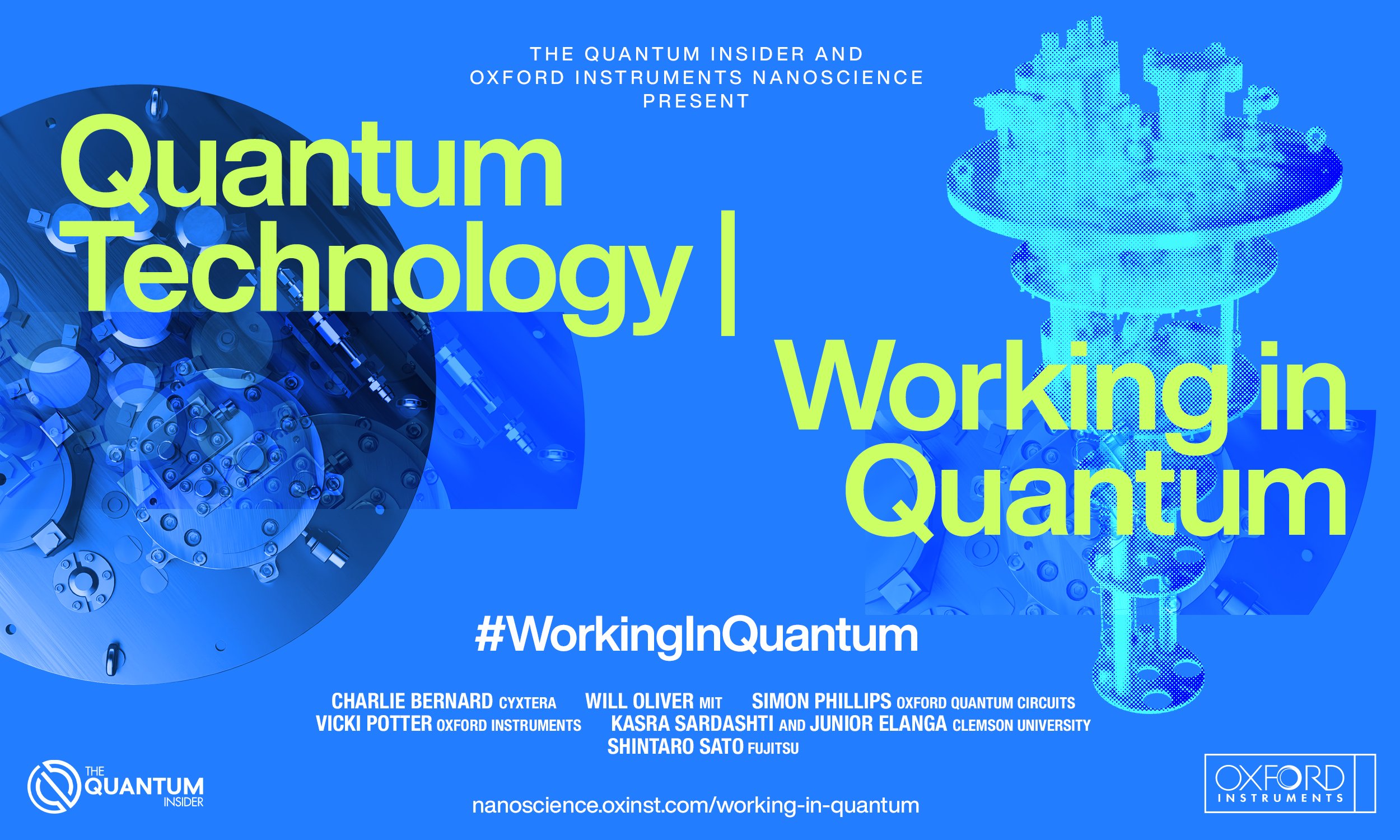Insider Brief
- Oxford Instruments and The Quantum Insider today launch the latest installment of the Working in Quantum interview series.
- The series offers insights from leading individuals within the industry.
- Key takeaways from the interviews include the importance of collaboration, diversity, and education in realising quantum’s potential.
PRESS RELEASE — Oxford Instruments and The Quantum Insider today launch the latest installment of the Working in Quantum interview series. Six video interviews, available to watch on Oxford Instruments and The Quantum Insider websites and social platforms, offer insights from leading individuals within the industry. Experts from Clemson University, Cyxtera, Fujitsu, MIT, Oxford Quantum Circuits, and Oxford Instruments discuss what their organisations are doing to support the continued growth of the sector.
Key takeaways from the interviews include the importance of collaboration, diversity, and education in realising quantum’s potential. The conversations uncover the industry shift from the theoretical to practical applications, the importance of interdisciplinary collaboration to drive innovation, and synergy between academia and industry to facilitate progress and build a multi-disciplined workforce.
Encouraging more people into quantum
Against a backdrop of an increasing global skills shortage – according to the World Economic Forum, more than half of quantum companies are recruiting and they struggle to find people with the right skills – the interviewees highlight the need to encourage more people to consider a career in the industry. Vicki Potter, Group HR and Services Director, Oxford Instruments: “There is a misconception that quantum and quantum computing is something intimidating. There is something intimidating about the language, and yet it is not an intimidating place to work.”

Universities offering education in quantum technology at an earlier stage and supporting interdisciplinary research is helping to address the challenge. Five years ago, the talent base was dominated by quantum physicists, but now there is an influx of talent from adjacent industries, such as engineering and software development. Kasra Sardashti, Assistant Professor Electrical and Computer Engineering, Clemson University: “A lot of these problems are not new, so it is interesting to bring solutions from other fields into quantum research. We need a big field of people devoted to this research and that requires a lot of collaboration.”
Easier access to quantum computers driving industry maturity
The interviewees talk about the growing maturity in the ecosystem. For example, partnerships between companies like Cyxtera and OQC have made it easier for new entrants to gain access to quantum computers. Democratising access is bringing the industry closer to expected breakthroughs, perhaps within a decade. Charlie Bernard, Director of Growth Strategy EMEA, Cyxtera: “We’re going to evolve to the next stage of computing, delivering outcomes we never thought we could achieve on classical computers; we know we’re going to get to that stage in the next five, ten years.”
Shintaro Sato, Head of the Quantum Laboratory, Fujitsu on recent advances in quantum computing: “The number of qubits is increasing, and the fidelity is getting better and better. So, in the near future, perhaps the next two or three years, we will see applications in material sciences, drug discovery, and the financial area.”
Battling hype with optimism
Hype continues to be a challenge for quantum, as with any emerging technology. William Oliver, Professor of Electrical Engineering and Computer Science, MIT, “There’s a tremendous promise to quantum technologies and that leads to a lot of hype currently in the media. The fact that there’s hype reflects the fact that there’s tremendous promise, but what gets lost in that is that making hardware and doing engineering is hard and it takes time.”
However, hype in the short term may be irrelevant in the long term as the interviewees felt that the optimism offered by the promise of quantum technology is only going to grow. Simon Phillips, CTO at Oxford Quantum Circuits OQC, “We’ll look back in ten years time and think how we ever lived without quantum technology.”
Talking about the series, Matt Martin, Managing Director of Oxford Instruments NanoScience said, “We are proud to partner with The Quantum Insider again on our second series of Working in Quantum. This new instalment underscores the importance of collaboration, diversity and education to realise quantum’s potential, all three of which are core to Oxford Instruments’ ethos as a facilitator of the quantum ecosystem. With our second series, we aim to highlight how we can develop a strong, multi-disciplinary workforce that will be necessary to drive the innovation of practical quantum technologies into the future.”
Videos Available
- Will Oliver (MIT)
- Charlie Bernard (Cyxtera)
- Vicki Potter (Oxford Instruments)
- Shintaro Sato (Fujitsu)
- Simon Phillips (OQC)
- Kasra Sardashti (Clemson University)
About Oxford Instruments NanoScience
Oxford Instruments NanoScience designs, supplies and supports market-leading research tools that enable quantum technologies, new materials and device development in the physical sciences. Our tools support research down to the atomic scale through creation of high performance, cryogen-free low temperature and magnetic environments, based upon our core technologies in low and ultra-low temperatures, high magnetic fields and system integration, with ever-increasing levels of experimental and measurement readiness. Oxford Instruments NanoScience is a part of the Oxford Instruments plc group.
About Resonance
Resonance is the leading provider of market intelligence across deep technology verticals. It owns and operates a portfolio of media and intelligence offerings for the strategic integration of breakthrough technologies that are poised to transform our world (The Quantum Insider, Space Impulse, Metaverse Insider, Climate Insider and AI Insider). These intelligence platforms collect and synthesize extensive data from an array of sources within complex, emerging industries, creating actionable insights that pave the way for intelligent collaborations, smart investments and innovative scientific advances. The business serves hundreds of clients – ranging from startups to national governments – with its SaaS subscription intelligence, strategic advisory and marketing offerings.
For more market insights, check out our latest quantum computing news here.




















